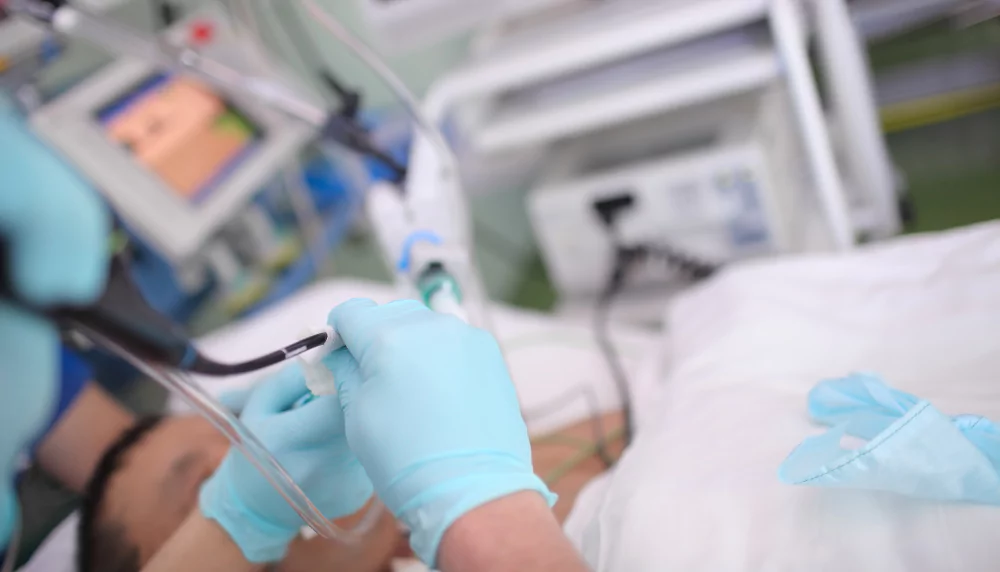More than 5 million people in the US end up in the ICU every year. While the ICU is designed to provide critical care for the sickest patients, there are many reasons for ICU admission and the decision to admit someone isn’t always straightforward.
Doctors consider several factors, including the severity of the illness, a patient’s age and overall health, the likelihood of recovery (prognosis), the patient’s wishes and preferences, and even the availability of ICU beds and resources in the hospital.
This article explores the common conditions that can land you in the ICU, along with their symptoms, to help you understand when to seek medical attention.
Respiratory Failure
Breathing is a vital function, and when it becomes compromised, it can be a frightening experience. Respiratory failure can come as a result of many conditions. Some general symptoms include difficulty breathing (shortness of breath or feeling like you can’t get enough air), low oxygen levels (detected by a pulse oximeter), and rapid breathing (tachypnea). These respiratory conditions can land you in the ICU:
Pneumonia
This is a lung infection that causes inflammation and fluid buildup in the air sacs. When severe, your lungs cannot get enough oxygen into the bloodstream, necessitating ICU support for breathing and oxygen delivery.
COVID-19 ARDS (Acute Respiratory Distress Syndrome)
In severe COVID-19 cases, lung inflammation can progress to ARDS. ARDS disrupts oxygen exchange, requiring a breathing machine – mechanical ventilation available in the ICU.
COPD Exacerbation
Chronic obstructive pulmonary disease (COPD) makes breathing difficult. During a COPD exacerbation, symptoms worsen dramatically and can lead to respiratory failure.
Asthma Attack
A severe asthma attack can cause airways to narrow, restricting airflow and oxygen intake. If an asthma attack becomes life-threatening, admitting the patient into the ICU might be necessary.
Pulmonary Embolism
A blood clot lodged in a lung artery (pulmonary embolism) can block blood flow and disrupt oxygen exchange. Large or multiple embolisms can lead to rapid respiratory failure.
Cardiovascular Issues
Cardiovascular issues can come with a range of symptoms such as chest pain/discomfort, shortness of breath, palpitations, dizziness, lightheadedness, fatigue, weakness, limb pain, ankle swelling, sudden swearing, and others. Many cardiovascular issues can progress to critical stages if left unaddressed.
Heart Attack
A heart attack happens when blood flow to a part of the heart muscle is cut off by a blocked coronary artery. Severe heart attacks can damage the heart and compromise its pumping ability.
Heart Failure
This condition weakens the heart’s ability to pump blood effectively. In severe heart failure, your body may struggle to get enough oxygenated blood, leading to fluid buildup, breathing problems, and even organ failure.
Arrhythmias (Irregular Heartbeat)
Some arrhythmias disrupt the heart’s regular rhythm and can affect its pumping efficiency. While some arrhythmias are not life-threatening (or as doctors call them – benign), life-threatening arrhythmias can cause a rapid or slow heart rate, leading to decreased blood flow and potential cardiac arrest.
Major Bleeding
Severe blood loss can lead to shock, a life-threatening condition where the body isn’t getting enough blood flow. Depending on the source and severity of the bleeding, ICU admission might be necessary for rapid blood resuscitation, blood product transfusions, and monitoring to prevent further complications.
Neurological Conditions
The human brain is the control center for everything we do, so neurological problems can manifest in a variety of ways: confusion, loss of consciousness, weakness, paralysis, or seizures. These symptoms can indicate a serious neurological condition that might require ICU admission for intensive monitoring, treatment, and support. Let’s explore some specific neurological conditions that can land you in the ICU.
Stroke
A stroke happens when blood flow to part of the brain is interrupted, causing brain tissue damage. Depending on the severity and location of the stroke, patients might experience life-threatening complications like coma or breathing difficulties.
Severe Head Injury
A blow to the head can cause internal bleeding, swelling, and damage to brain tissue. The severity of a head injury determines the need for ICU admission. Severe head injuries can lead to coma, increased pressure within the skull, and breathing difficulties, all of which necessitate close monitoring and potential interventions available in an ICU setting.
Brain Bleed (Intracranial Hemorrhage)
Bleeding within the skull can put pressure on the brain and damage brain tissue. Symptoms can vary depending on the location and size of the bleed. Large or rapidly growing bleeds can cause life-threatening complications like coma, herniation (brain tissue shifting), and breathing problems.
Meningitis
Inflammation of the protective membranes surrounding the brain and spinal cord can be caused by viruses, bacteria, or fungi. While some cases are mild, severe meningitis can lead to brain swelling, seizures, coma, and even death.
Encephalitis
This is an inflammation of the brain tissue itself, often caused by viruses. Symptoms can vary and include confusion, seizures, weakness, and even coma. Severe encephalitis can lead to brain swelling, increased pressure within the skull, and breathing difficulties.
Status Epilepticus (Seizures)
A seizure is a sudden surge of electrical activity in the brain that causes abnormal behavior and sensations. Status epilepticus occurs when a seizure lasts for an extended period (usually more than 5 minutes) or when there are repeated seizures without full recovery in between. This can lead to brain damage, coma, and breathing difficulties.
Sepsis and Shock
When your body fights an infection, it triggers an inflammatory response. However, this response can sometimes become overwhelming, leading to a life-threatening condition called sepsis. Sepsis can further deteriorate into septic shock, a state of critical illness with impaired blood flow and oxygen delivery. Fever, chills, rapid heart rate, breathing problems, and confusion are all symptoms of sepsis.
Sepsis
This serious infection triggers an inflammatory response that can damage organs. If it progresses to septic shock, blood flow and oxygen delivery become critically impaired.
Septic Shock
A life-threatening complication of sepsis, septic shock causes dangerously low blood pressure and inadequate blood flow. In the ICU, patients receive powerful medications to restore circulation, along with close monitoring and potential life-support measures like breathing machines and kidney dialysis.
Anaphylactic Shock
A severe allergic reaction, or anaphylactic shock triggers airway narrowing, breathing problems, and a drop in blood pressure. The ICU environment allows for swift administration of medications to counteract the allergic reaction, manage breathing difficulties, and stabilize the patient’s condition.
Pancreatitis
Inflammation of the pancreas – severe pancreatitis can disrupt blood flow and lead to organ dysfunction. ICU care provides intensive pain management, fluids, and nutritional support, while also addressing complications and preventing shock.
Trauma and Burns
Traumatic injuries and severe burns can cause significant damage to the body’s tissues and disrupt its normal functions. These events can arise from various causes, such as major accidents, falls, gunshot wounds, or thermal injuries. While symptoms vary depending on the specific trauma or burn, some common signs include pain, bleeding, and difficulty breathing. In severe cases, these injuries can lead to life-threatening complications, necessitating admission to the ICU for intensive care and monitoring.
Major Trauma
Major accidents, falls, or assaults can cause serious internal bleeding, broken bones, and organ damage. If these injuries lead to life-threatening complications like shock, bleeding, or respiratory failure, the ICU steps in. Here, trauma patients receive critical care including surgery, blood transfusions, pain management, breathing support, and close monitoring to stabilize their condition and prevent further harm.
Burns
Severe burns from fire, heat, chemicals, or electricity can extensively damage the skin and underlying tissues. The severity depends on the burn depth and the percentage of body surface area affected. Deep or extensive burns can lead to dangerous fluid loss, infection, breathing problems, and even organ failure. The ICU provides specialized wound care, fluid, pain management, and potential interventions like breathing support and nutritional support to manage these complications and promote healing.
Postoperative Care
Following major surgery, especially those with a high risk of complications, some patients might require an extended stay in the ICU. This specialized unit provides critical care for patients who experience complications after surgery, such as bleeding, infection, or respiratory failure.
The ICU is important for postoperative care because it can offer:
- Close Monitoring: ICU staff keeps a watchful eye on vital signs like heart rate, blood pressure, and oxygen levels, so they can detect and prevent any surgery complications ahead of time.
- Advanced Interventions: The ICU is equipped with advanced technology and medications to address complications like bleeding control, infection management, and respiratory support if needed.
- Pain Management: Effective pain management is crucial for recovery, and the ICU can provide a controlled environment for administering powerful pain medication to ensure comfort and help healing.
- Specialized Support: For certain complex surgeries, the ICU might have specialized equipment and staff trained to manage specific complications related to the procedure.
The ICU acts as a safety net after major surgery, providing intensive monitoring, interventions, and support to ensure a smooth recovery for patients at high risk of complications.
Other Conditions That Can Land You in the ICU
The ICU isn’t just for immediate life-threatening emergencies. It also plays a role in managing critical complications that can be triggered by various conditions. Here are some situations where the ICU can provide essential care:
- Severe Poisoning or Drug Overdose: In cases of severe poisoning or drug overdose, the ICU can provide critical interventions like decontamination, antidotes, and life support measures to stabilize the patient and promote recovery.
- Multi-Organ Failure: When multiple organs like the kidneys, lungs, or liver start to fail simultaneously, the ICU offers intensive monitoring, organ support therapies like dialysis or ventilation, and interventions to prevent further organ damage.
- Acute Kidney Injury: A sudden and severe decline in kidney function can be life-threatening. The ICU provides dialysis (artificial blood filtration) to remove waste products from the blood, fluid management, and supportive care until the kidneys recover.
- Cancer-related ICU care: Cancer patients sometimes require ICU admission for various reasons. This frequently occurs after undergoing chemotherapy or a bone marrow transplant, where they might experience complications like bleeding or infection.
These are just a few examples, and advancements in medical care are constantly expanding the role of the ICU in managing various complex conditions.
Conclusion
For critically ill patients, the ICU is a lifeline. It provides constant monitoring and lifesaving interventions to help them recover. This article explored various conditions that can land a patient in the ICU, but the most important thing to remember is this: getting help early is key!
If you know the warning signs of different illnesses, you can see a doctor sooner. Early treatment often means a faster recovery, and you might not even need the ICU. Even in situations where the ICU is necessary, having a basic understanding of critical conditions can help you feel more in control.
Remember, knowledge is a powerful tool when it comes to your health. Don’t hesitate to discuss any concerning symptoms with your doctor and prioritize prevention whenever possible.





